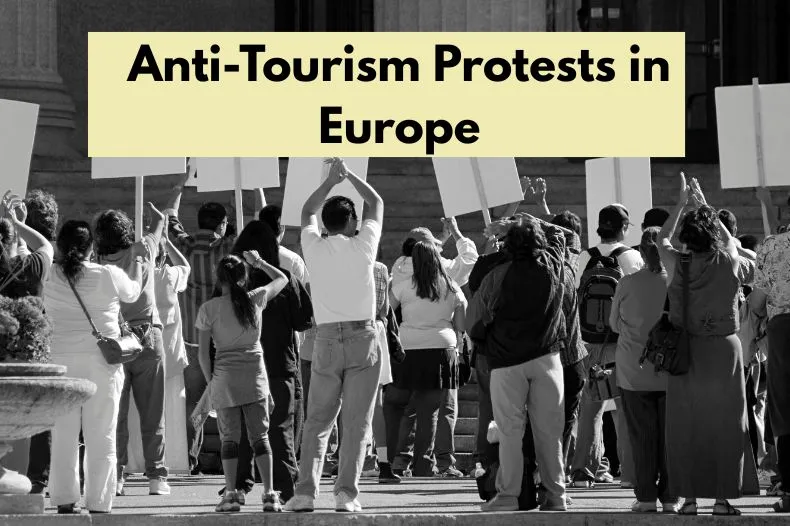
If you’re planning a trip to Southern Europe, you’ve probably heard about the recent anti-tourism protests in Europe. From Italy to Spain and Portugal, locals are speaking up about the effects of overtourism, changing the travel experience for millions this season.
These tourism protests aren’t just headlines—they’re affecting when, where, and how you can visit your favorite destinations.
This article will break down what’s happening, what tourists should expect, and practical tips for navigating Europe’s evolving travel landscape.
Why Are Anti-Tourism Protests Happening?
The rise in anti-tourism protests in Europe reflects deep frustrations among residents in top tourist cities. In places like Barcelona and Venice, surging visitor numbers have caused problems like crowded streets, skyrocketing housing prices, environmental pressure, and noise.
Locals argue that overtourism is pushing out residents, turning neighborhoods into endless streams of short-term rentals, and putting public services under strain.
Barcelona protests, for example, often draw attention to the impact of tourism on daily life.
In Venice, activists call out the problem of massive cruise ships and swarms of summer tourists. Portugal’s major cities, such as Lisbon and Porto, are facing similar challenges.
Where Are the Protests Happening?
- Spain: Barcelona, Madrid, and some Balearic Islands report regular tourism protests.
- Italy: Venice, Florence, and Rome have seen organized demonstrations and small-scale blockades.
- Portugal: Lisbon and Porto are seeing their first major anti-tourism rallies this year.
Most protests focus on areas with historic sites, city centers, and famous landmarks. This means disruptions tend to occur exactly where most travelers go.
How Are Protests Affecting Travelers?
If you’re traveling during an anti-tourism protest in Europe, you might notice:
- Temporary closures of tourist attractions
- Road or public transport disruptions
- Larger police presence in city centers
- Unplanned changes to opening hours
- Cancelled or altered cultural events
While most events are peaceful, it’s wise to stay alert and keep a flexible schedule. Some demonstrations may occur without warning.
Tips for Visiting Europe During Tourism Protests
Here’s how you can still enjoy your trip and be a responsible traveler:
- Stay Updated: Follow local news, tourism boards, and social media for real-time updates on protest activity.
- Avoid Hotspots: If a protest is scheduled, explore other neighborhoods or visit attractions outside the affected areas.
- Respect Local Sentiment: Show empathy toward residents. Avoid large tour groups or rowdy behavior, and support local businesses away from tourist hubs.
- Book Flexible Accommodations: Choose hotels or apartments with generous cancellation policies in case plans need to change.
- Consider Off-Peak Travel: Visit big cities early in the morning or during shoulder seasons when crowds are smaller.
- Travel Light: Keep essentials with you and avoid carrying large amounts of cash or valuables in protest areas.
What Can Tourists Do to Help?
Travelers play a key role in easing tensions caused by overtourism. Practicing responsible travel, supporting community projects, and respecting local customs make a real difference.
Consider joining small group tours led by locals, using public transportation, and choosing sustainable activities when possible.
Sources
New York Times – Anti-Tourism Protests in Italy, Portugal and Spain
BBC News – Why are Europeans Protesting Tourists?
Final Thoughts
Anti-tourism protests in Europe are a sign that popular destinations are struggling under the weight of their own success. As a traveler, awareness and respect are your biggest assets.
By planning ahead and practicing mindful tourism, you can have an enriching trip and contribute to positive change in the places you love. Stay informed, stay flexible, and you’ll navigate Europe’s evolving travel scene with ease.
FAQs
1. Why are there anti-tourism protests in Europe in 2025?
Anti-tourism protests in Europe are happening because local residents in cities like Barcelona, Venice, and Lisbon are frustrated by overtourism.
They feel crowded, see rising housing costs, and believe tourism is hurting their quality of life and local culture.
2. Which European cities are most affected by the protests?
Cities most affected include Barcelona, Venice, Lisbon, Rome, and some towns in the Balearic Islands. These places see the highest tourist numbers and have organized protests or strikes.
3. How do anti-tourism protests impact travelers?
Travelers may face temporary closures of attractions, changes to public transport, roadblocks, or larger police presence. Protests are usually peaceful but can disrupt travel plans, especially near city centers or landmarks.
4. Is it safe to visit Europe during these protests?
Yes, travel to Europe is generally safe. Most protests are peaceful. However, it’s smart to stay informed about protest schedules, avoid large gatherings, and follow local advice.
5. What can travelers do to be respectful during their visit?
Travelers should avoid protest areas, respect local communities, use public transport, support local businesses, and follow city rules. Booking outside major tourist zones and traveling in smaller groups also helps.
